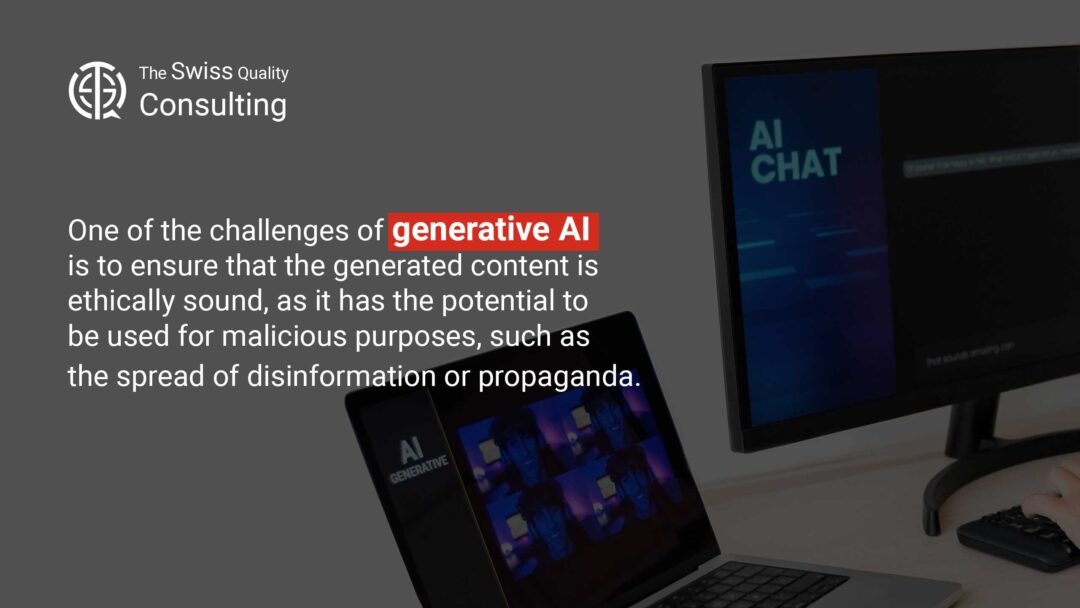Unraveling the Challenge: Ethical Considerations in Generative AI
In the rapidly evolving landscape of technological innovation, Generative Artificial Intelligence (AI) stands as a beacon of promise, transforming industries and redefining business strategies. However, amidst the potential for creative breakthroughs, a significant challenge looms Ethical Considerations implications of generative AI. As business executives, mid-level managers, and entrepreneurs, understanding and addressing these ethical considerations is not just a responsibility; it is paramount for responsible and sustainable innovation.
The Potential for Misuse: A Critical Examination
The quote rightly identifies a central challenge in the realm of generative AI—the risk of misuse for malicious purposes. The technology’s ability to autonomously generate content, be it text, images, or multimedia, carries the inherent potential for misuse, including the spread of disinformation or propaganda.
This challenge underscores the need for a comprehensive approach to ensure that generative AI is deployed ethically and responsibly. Business leaders must acknowledge this risk and actively engage in strategies that mitigate the potential for misuse, safeguarding not only their organizations but also the broader societal impact of AI technologies.
Change Management: Incorporating Ethical Considerations into AI Integration
Effective change management in the realm of AI must extend beyond technological implementation—it should encompass ethical considerations as an integral component. As businesses integrate generative AI into their workflows, addressing the ethical dimension should be a strategic priority.
Change management strategies need to incorporate ethical frameworks, fostering a culture of responsible AI usage within the organization. This involves educating teams about the potential ethical challenges associated with generative AI and instilling a sense of responsibility in leveraging this technology. By integrating ethical considerations into the change management process, businesses can navigate the transformative journey of AI adoption with integrity.
Executive Coaching Services: Navigating the Ethical Frontier
Executive coaching services play a pivotal role in guiding leadership teams through the ethical considerations of generative AI. As leaders grapple with the complexities of AI deployment, coaching can provide insights and strategies to navigate the ethical frontier effectively.
Coaching sessions can delve into the ethical implications of generative AI, helping leaders develop a keen understanding of the potential risks and guiding them in fostering a culture of ethical responsibility within their organizations. Leaders equipped with ethical leadership skills can make informed decisions that align with both the technological and ethical imperatives of AI integration.
Effective Communication: Transparency in AI Practices
Transparent communication is a cornerstone of ethical AI integration. Organizations must communicate openly about the ways in which generative AI is utilized, its potential impact, and the measures in place to ensure ethical practices.
Effective communication fosters trust not only within the organization but also among stakeholders and the broader community. By being transparent about their AI practices, businesses can actively demonstrate their commitment to ethical considerations, mitigating concerns and building a positive reputation in the ethical use of generative AI.
Leadership and Management Skills: Balancing Innovation with Responsibility
Leadership in the age of generative AI demands a delicate balance between fostering innovation and upholding ethical standards. Executives need to cultivate strong leadership and management skills that prioritize ethical considerations alongside technological advancements.
Leaders must be proactive in establishing ethical guidelines for AI usage within their organizations, emphasizing the importance of responsible innovation. This involves continuous monitoring and evaluation of AI applications, ensuring that they align with ethical standards and contribute positively to the organization and society at large.
Risk Management Strategies: Safeguarding Against Misuse
Mitigating the risks associated with generative AI requires robust risk management strategies. Organizations should proactively identify potential misuse scenarios and implement measures to safeguard against them.
Risk management involves comprehensive assessments of AI applications, continuous monitoring, and swift response mechanisms in case of any deviation from ethical standards. By integrating risk management into their AI strategies, businesses can mitigate the potential for misuse and establish themselves as ethical leaders in the adoption of generative AI.
Conclusion: A Call to Ethical Leadership in AI
In conclusion, the challenges posed by generative AI’s potential for misuse underscore the critical importance of ethical leadership and responsible innovation. As business executives, mid-level managers, and entrepreneurs, the responsibility to navigate the ethical landscape of AI rests squarely on our shoulders.
Generative AI has the power to revolutionize industries and drive unprecedented innovation. However, this transformative potential must be harnessed responsibly to avoid unintended consequences. By incorporating ethical considerations into change management, executive coaching, communication strategies, leadership skills, and risk management, businesses can pave the way for a future where the benefits of generative AI are realized without compromising ethical standards.
Let us embrace the ethical imperative of generative AI, fostering a culture of responsible innovation that not only propels our organizations forward but also contributes positively to the broader societal landscape.
#GenerativeAI #EthicalAI #ResponsibleInnovation #LeadershipSkills #AIIntegration























